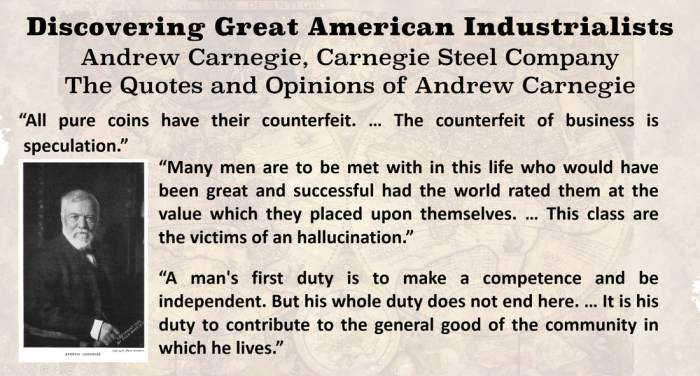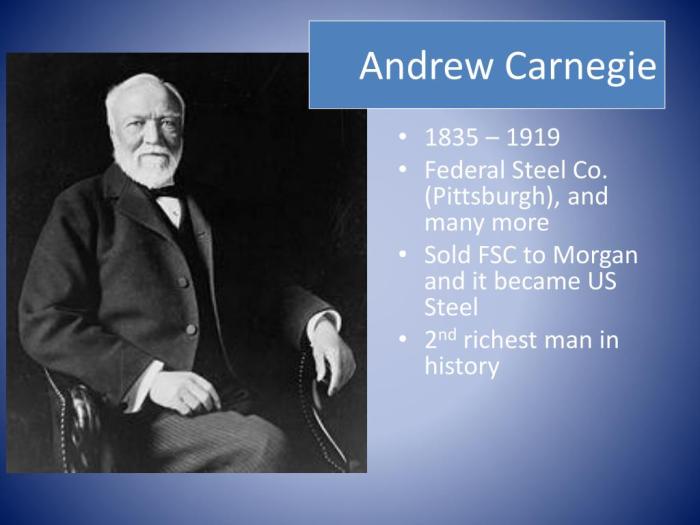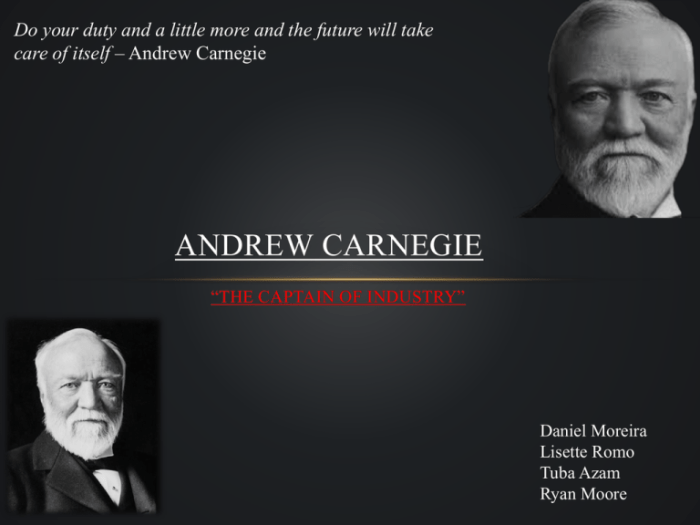Andrew carnegie pros and cons – Delving into the fascinating realm of Andrew Carnegie, this article explores the intricate tapestry of his life and legacy. Known for his remarkable philanthropy and ruthless business practices, Carnegie’s impact on American society is both profound and enduring.
From his humble beginnings to his unparalleled success in the steel industry, Carnegie’s journey is marked by both triumphs and ethical quandaries. His philanthropic endeavors, such as the establishment of libraries and universities, stand as testaments to his belief in the transformative power of education.
Andrew Carnegie’s Philanthropy
Andrew Carnegie, the Scottish-American industrialist, dedicated the latter part of his life to philanthropy, giving away nearly 90% of his wealth. His motivations for this were complex, but they largely stemmed from his belief that the wealthy had a moral obligation to use their resources to benefit society.Carnegie’s
most notable philanthropic endeavors included the establishment of the Carnegie Corporation of New York, the Carnegie Endowment for International Peace, and the Carnegie Institution for Science. He also funded the construction of over 2,500 public libraries in the United States and Europe, as well as numerous other educational and cultural institutions.The
Carnegie’s legacy is a complex one, with both positive and negative aspects. While he was a generous philanthropist who established numerous institutions of higher learning, he was also a ruthless businessman who used questionable tactics to amass his fortune. For more insights into Carnegie’s life and the American industrial era, check out the American Yawp Chapter 3 notes . Returning to Carnegie’s pros and cons, it’s important to weigh his contributions to society against his questionable business practices.
impact of Carnegie’s philanthropy on American society was profound. His libraries and other educational institutions helped to democratize access to knowledge, while his support for peace and international cooperation contributed to the development of a more just and equitable world.
Carnegie’s legacy as a philanthropist continues to inspire others to give back to their communities.
Carnegie’s Libraries
Carnegie’s belief in the importance of education led him to fund the construction of over 2,500 public libraries in the United States and Europe. These libraries were designed to be accessible to all people, regardless of their socioeconomic status. They provided free access to books and other resources, and they quickly became important centers of learning and community activity.Carnegie’s
libraries had a profound impact on American society. They helped to democratize access to knowledge, and they played a major role in the development of an informed and literate citizenry. Carnegie’s libraries continue to be important cultural institutions today, and they serve as a lasting testament to his commitment to education and philanthropy.
Carnegie’s Support for Peace
Carnegie was a lifelong advocate for peace. He believed that war was a barbaric and wasteful way to resolve conflicts. In 1910, he established the Carnegie Endowment for International Peace, which was dedicated to promoting peace through education, research, and diplomacy.The
Carnegie Endowment for International Peace has been a major force for peace in the world. It has helped to resolve conflicts, promote understanding between nations, and advance the cause of disarmament. Carnegie’s legacy as a peacemaker continues to inspire others to work for a more just and peaceful world.
Carnegie’s Business Practices
Andrew Carnegie, the renowned industrialist, employed ruthless business tactics to amass his fortune. These tactics, while benefiting Carnegie, raised ethical concerns and had significant implications for his employees.
Vertical Integration
Carnegie vertically integrated his steel industry, controlling every aspect of production from raw materials to finished goods. This strategy reduced costs and increased efficiency, but it also gave Carnegie immense power over the industry and stifled competition.
Wage Suppression, Andrew carnegie pros and cons
Carnegie suppressed wages to maximize profits. He paid his workers low wages and resisted unionization efforts. This practice led to poor working conditions and labor unrest, ultimately culminating in the infamous Homestead Strike of 1892.
Ethical Implications
Carnegie’s business practices raised ethical concerns. His vertical integration tactics stifled competition, while his wage suppression practices exploited workers. These methods raised questions about the balance between corporate profits and social responsibility.
Carnegie’s Legacy

Andrew Carnegie’s impact on American industry and philanthropy is still felt today. His business practices revolutionized the steel industry, and his philanthropic endeavors have had a lasting impact on education, culture, and scientific research.
Comparison to Other Industrialists
Compared to other industrialists of his time, such as John D. Rockefeller and J.P. Morgan, Carnegie was unique in his commitment to philanthropy. While Rockefeller and Morgan focused primarily on accumulating wealth, Carnegie believed that the wealthy had a responsibility to give back to society.
He was also a strong advocate for education, believing that it was the key to economic and social progress.
Relevance in Modern Business
Carnegie’s ideas and practices remain relevant in the modern business world. His emphasis on efficiency and innovation is still a cornerstone of successful businesses. His belief in the importance of philanthropy is also increasingly recognized by corporations today. Many companies now have corporate social responsibility programs that aim to give back to the communities in which they operate.
Carnegie’s Personal Life

Andrew Carnegie’s humble beginnings and unwavering determination shaped his remarkable life. His childhood experiences, education, and family dynamics laid the foundation for his philanthropic endeavors and business acumen.
Childhood and Education
Born in Dunfermline, Scotland, in 1835, Carnegie’s childhood was marked by poverty and hardship. His father was a handloom weaver, and his mother worked as a domestic servant. Despite their financial struggles, Carnegie’s parents instilled in him a strong work ethic and the value of education.
At the age of 13, Carnegie immigrated to the United States with his family. He worked as a bobbin boy in a cotton mill while attending night school to improve his literacy and numeracy skills. His relentless pursuit of knowledge laid the groundwork for his future success.
Family Life
Carnegie married Louise Whitfield in 1887. The couple had one daughter, Margaret. Carnegie was a devoted husband and father, and his family played a significant role in his life. He often sought their counsel and valued their opinions.
Personal Beliefs and Motivations
Carnegie’s personal beliefs were deeply rooted in his Christian faith and the principles of social Darwinism. He believed that individuals had a moral obligation to help those less fortunate and that society should be structured to reward hard work and ingenuity.
Carnegie’s philanthropy was driven by his conviction that wealth should be used to improve the lives of others. He believed that libraries, educational institutions, and other public amenities were essential for the progress of society.
Carnegie’s Social and Political Views: Andrew Carnegie Pros And Cons

Andrew Carnegie was a staunch believer in social Darwinism, the idea that the fittest individuals and societies would naturally rise to the top. He believed that the role of government should be limited to protecting individual rights and property, and that it should not interfere in the free market.
Involvement in Labor Disputes and Social Reform Movements
Despite his belief in social Darwinism, Carnegie was also a philanthropist who supported social reform movements. He donated money to libraries, schools, and other institutions that benefited the working class. He also advocated for labor unions and the eight-hour workday.
Influence on Business Practices and Philanthropy
Carnegie’s social and political beliefs had a significant influence on his business practices and philanthropy. He believed that businesses had a responsibility to their employees and to society as a whole. He paid his workers fair wages and provided them with benefits such as health insurance and pensions.
He also donated a large portion of his wealth to charitable causes.
Carnegie’s Impact on Education

Andrew Carnegie was a renowned philanthropist who dedicated significant resources to education. His belief in the transformative power of knowledge led him to establish numerous libraries, universities, and other educational institutions.Carnegie’s educational initiatives had a profound impact on American society.
His libraries provided access to books and information for countless individuals, fostering a love of reading and learning. His universities, such as Carnegie Mellon University, became renowned for their academic excellence and research contributions. By providing scholarships and financial support to students, Carnegie helped break down barriers to education and created opportunities for individuals from all backgrounds to pursue higher education.
Relevance of Carnegie’s Educational Philosophy in the Modern Era
Carnegie’s educational philosophy remains relevant in the modern era. He emphasized the importance of lifelong learning, believing that education should not be confined to formal institutions but should be a continuous process. His focus on practical knowledge and problem-solving skills continues to resonate in today’s rapidly changing world.
Additionally, his commitment to diversity and inclusion in education is a valuable lesson for modern educators. By embracing Carnegie’s educational ideals, we can continue to foster a society where all individuals have the opportunity to learn, grow, and contribute to their communities.
User Queries
What were Carnegie’s motivations for philanthropy?
Carnegie believed in the “Gospel of Wealth,” advocating that wealthy individuals had a moral obligation to use their fortunes for the betterment of society.
What were the pros and cons of Carnegie’s business practices?
Pros: Vertical integration and wage suppression allowed Carnegie to dominate the steel industry and amass vast wealth. Cons: These practices led to labor disputes and allegations of unfair competition.
How did Carnegie’s social and political views influence his business practices?
Carnegie’s belief in social Darwinism justified his ruthless business tactics, as he saw competition as a natural force that would ultimately benefit society.